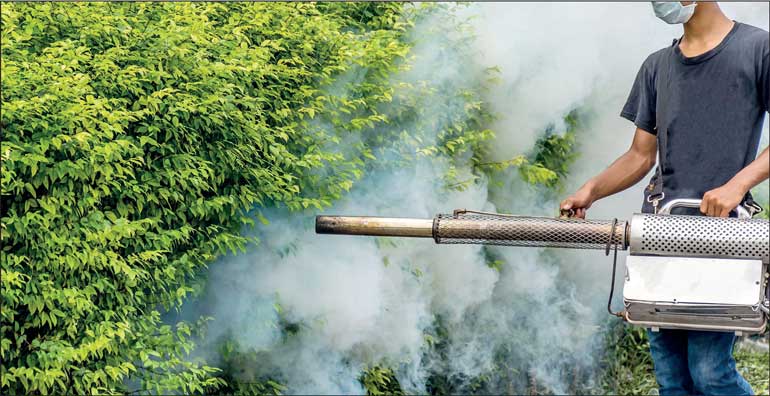Monday Feb 16, 2026
Monday Feb 16, 2026
Wednesday, 5 February 2025 00:28 - - {{hitsCtrl.values.hits}}

DDT appears to be the way forward
 And so the deadly ‘Dengue Season,’ not to mention the onset of the paralysing Chikungunya [read D/Mirror Headlines of 4 Feb 2025: “Rise in Chikungunya cases; highest number of infections reported.’] is amidst us – killing and maiming thousands. Malaria too would be striking its ‘customary’ areas of the island – killing people like us.
And so the deadly ‘Dengue Season,’ not to mention the onset of the paralysing Chikungunya [read D/Mirror Headlines of 4 Feb 2025: “Rise in Chikungunya cases; highest number of infections reported.’] is amidst us – killing and maiming thousands. Malaria too would be striking its ‘customary’ areas of the island – killing people like us.
Whilst numerous steps have been taken to minimise these deadly mosquito attacks, it still appears to be a losing battle. More and more of our citizens are bound to suffer immeasurably and even end up having a tryst with their Maker.
Should this situation prevail? During the 1950s and early 1960s, dengue was unheard of and even malaria was under control due to DDT spraying.
In this context, for the benefit of our readers, let me turn the spotlight to Africa and quote extracts from a past issue of Newsweek – Sept. 24 ‘07, captioned: ‘To fight malaria, African nations are turning to DDT’ – By Scot Johnson.
Coherent strategy to fight malaria
“Fifty years ago Africa had a coherent strategy to fight malaria. It involved spraying large amounts of the pesticide dichlorodiphenyltrichloroethane, or DDT, to curb the mosquito that carries malaria. This campaign was hugely successful, but it came to a halt shortly after the 1962 publication of Rachel Carson’s Silent Spring, which described the environmental consequences of DDT running into lakes and rivers. Then malaria cases soared [once again] in the African Continent, except in South Africa, which continued to spray DDT. Finally, in 1996 pressured by environmental groups, South Africa dropped DDT for a less toxic alternative [like in Sri Lanka – stopping DDT and spraying some other chemical which has proved to be less potent – in fact, useless!] Four years later South Africa was facing its first malaria epidemic in half a century.”
“Now the story has turned back again. South Africa resumed spraying in 2000, and malaria outbreaks declined. Health officials from South Africa and the United States helped persuade the World Health Organisation [WHO] to approve DDT for malaria control, saying the benefits were worth the risks.”
“Today South Africa stands virtually alone on the continent, having gotten malaria under control again. [Zambia followed its lead, with similar results]. Now the rest of the continent is coming along as well. Last year Mozambique embarked on a limited spraying campaign; health officials say they see signs of improvement. In November, Uganda will roll out a large-scale DDT regime, backed by its then President, Yoweri Museveni. Tanzania and Kenya are both considering starting DDT-spraying campaigns.”
“The return of DDT is part of a broader recognition that controlling malaria is a high priority for Africa – and that fighting it will require all the tools health officials can muster.”
“US [then] First Lady Laura Bush recently visited Mozambique on behalf of the $ 1.2 billion President’s malaria initiative to promote, along other measures, the use of DDT in 15 African countries. DDT will be an important tool to help further reduce the annual malaria death toll in Africa, which is now 1 million, most of them children.”
“Rachel Carson’s claims about DDT may have been exaggerated, but scientists have changed their assessment of the risks in recent years. Whereas large-scale, indiscriminate spraying is harmful, targeted spraying in small amounts can deter mosquitoes with little effect on humans.”
 “DDT’s main virtues are that it’s cheap – six times cheaper than alternative pesticides – and long-lasting. One dosage can work for nine months, long enough to span peak malarial seasons in most places. “I’m thrilled about it,” says Maureen Coetzee, chief of vector-control research at South Africa’s National Institute for Communicable Diseases. “It’s long over-due.” The Gates Foundation is pouring nearly $5 million into Africa to make sure DDT and other insecticides are used properly.”
“DDT’s main virtues are that it’s cheap – six times cheaper than alternative pesticides – and long-lasting. One dosage can work for nine months, long enough to span peak malarial seasons in most places. “I’m thrilled about it,” says Maureen Coetzee, chief of vector-control research at South Africa’s National Institute for Communicable Diseases. “It’s long over-due.” The Gates Foundation is pouring nearly $5 million into Africa to make sure DDT and other insecticides are used properly.”
“The Environmental Defense Fund, which once promoted Silent Spring and helped champion the movement to ban DDT, has endorsed its limited use for malaria control. While North America and Europe were fighting malaria in recent decades, it seemed that health experts had written off Africa as too difficult. They’ve changed their minds on that, too.” [End of Quote]
Exaggerated claim against DDT
Reading the aforementioned authoritative study courtesy Newsweek of 24 September 2007, it is evident that banning DDT in the early 1960s appears to have been based on some exaggerated claim against DDT.
So if we realistically wish to eradicate life-threatening malaria, the deadly dengue, crippling chikungunya and disfiguring filaria among other mosquito borne diseases, health authorities in Sri Lanka should take a leaf from African nations and resume spraying of DDT, albeit on a limited, regulated scale and prevent another outbreak of these killer diseases.
Apart from awareness campaigns re-mosquito breeding/prevention and spraying of DDT, may I also suggest that introduction of specific fish species that would make the mosquito larvae their meal! Further, ‘waste oil’ should be poured into pits such as gem-pits and such appropriate pits/unused well, etc. The thick film of oil would effectively prevent the larvae from breathing – killing it! The writer has personally done so successfully, during his days on tea/rubber estates.
Even at this time of writing, Global Research Institutes, notably in USA are in process of making available some wonderfully innovative methods of countering the deadly mosquito menace. For example, scientists at Columbia University are trying to block a mosquito’s sense of smell so it can’t find humans to bite! Others at Virginia Polytechnic Institute are developing pesticides that activate only inside a mosquito, thus posing no danger to humans or other animals – ‘zero mammalian toxicity,’ as a scientist would say – wow! That’ll be the day!
Whilst the future appears heartening, at least where research is heading, one should be realistic in this part of the world. For the present – get back to the past! DDT appears to be the way forward, like in Africa. Let us then go for DDT!
So to recap: Re-introduce DDT [Follow African countries who are doing so NOW], introduce fish in waterways in slow-moving rivers that harbour mosquito larvae; pour waste oil into gem-pits/unused wells, etc. – another effective method of killing the mosquito larvae. Of course prevent mosquito breeding in the first place, following the oft repeated, cliché-tic adage: prevention is better than cure!
Let us ALL aim to eradicate malaria, dengue, chikungunya, filaria, etc.
Our people deserve better than to suffer excruciating pain and even to die – preventable deaths! So Sri Lankan health authorities: Wake up from your slumber now! Tomorrow may be too late.